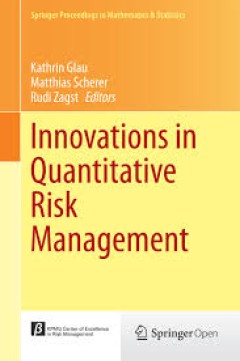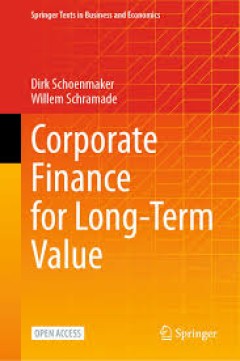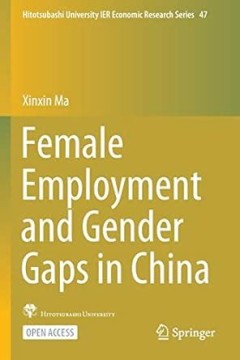Filter by

Advances in Crowdfunding = Research and Practice
This open access book presents a comprehensive and up-to-date collection of knowledge on the state of crowdfunding research and practice. It considers crowdfunding models and their different manifestations across a variety of geographies and sectors, and explores the perspectives of fundraisers, backers, platforms, and regulators. Gathering insights from a wide range of influential researchers …
- Edition
- 1
- ISBN/ISSN
- 9783030463090
- Collation
- XXVI, 531 hlm; ill., lamp.,
- Series Title
- -
- Call Number
- -

Innovations in Derivatives Markets : Fixed Income Modeling, Valuation Adjustm…
This book presents 20 peer-reviewed chapters on current aspects of derivatives markets and derivative pricing. The contributions, written by leading researchers in the field as well as experienced authors from the financial industry, present the state of the art in: • Modeling counterparty credit risk: credit valuation adjustment, debit valuation adjustment, funding valuation adjustment, a…
- Edition
- -
- ISBN/ISSN
- 978-3-319-33446-2
- Collation
- X, 449
- Series Title
- Springer Proceedings in Mathematics & Statistics (PROMS, volume 165)
- Call Number
- -

Innovations in Quantitative Risk Management : TU München, September 2013
Quantitative models are omnipresent –but often controversially discussed– in todays risk management practice. New regulations, innovative financial products, and advances in valuation techniques provide a continuous flow of challenging problems for financial engineers and risk managers alike. Designing a sound stochastic model requires finding a careful balance between parsimonious mode…
- Edition
- -
- ISBN/ISSN
- 978-3-319-09114-3
- Collation
- XI, 438
- Series Title
- Springer Proceedings in Mathematics & Statistics (PROMS, volume 99)
- Call Number
- -

Big Data and Artificial Intelligence in Digital Finance
This book has received funding from the European Union’s Horizon 2020 research and innovation programme under grant agreement No. 856632. Specifically, the chapters of the book present work and results achieved in the scope of the H2020 INFINITECH project. The editors acknowledge the contributions of all coauthors, as well as support from all INFINITECH project partners.
- Edition
- -
- ISBN/ISSN
- 9783030945909
- Collation
- XXIII, 363
- Series Title
- -
- Call Number
- -

Liquidity, Markets and Trading in Action : An Interdisciplinary Perspective
This open access book addresses four standard business school subjects: microeconomics, macroeconomics, finance and information systems as they relate to trading, liquidity, and market structure. It provides a detailed examination of the impact of trading costs and other impediments of trading that the authors call “frictions”. It also presents an interactive simulation model of equity mark…
- Edition
- 1
- ISBN/ISSN
- 9783030748173
- Collation
- XI, 103 hlm,: ill, lamp;
- Series Title
- -
- Call Number
- -

Built on Value: The Huawei Philosophy of Finance Management
This book presents the concept of value as the central component to success and longevity of the global ICT industry player, Huawei. It provides examples of how Huawei focuses on customers to pursue sustainable and profitable growth rather than focusing on capital market valuation which is a familiar scenario among Western companies. It is the business departments that are the creators of valu…
- Edition
- 1
- ISBN/ISSN
- 9789811375071
- Collation
- XXXVI, 456 hlm; ill., lamp.,
- Series Title
- -
- Call Number
- -

Corporate Finance for Long-Term Value
This open access textbook offers a guide to corporate finance for modern companies that want to create long-term value. Drawing on recent literature on sustainable companies, it starts by analysing the Sustainable Development Goals as a strategy for the transition to a sustainable economy. Next, it translates the general concept of sustainability into core corporate finance methods, such as net…
- Edition
- -
- ISBN/ISSN
- 978-3-031-35009-2
- Collation
- XXXIX, 630
- Series Title
- Springer Texts in Business and Economics (STBE)
- Call Number
- 650 WES m

The Brownian Motion : A Rigorous but Gentle Introduction for Economists
This open access textbook is the first to provide Business and Economics Ph.D. students with a precise and intuitive introduction to the formal backgrounds of modern financial theory. It explains Brownian motion, random processes, measures, and Lebesgue integrals intuitively, but without sacrificing the necessary mathematical formalism, making them accessible for readers with little or no previ…
- Edition
- -
- ISBN/ISSN
- 978-3-030-20103-6
- Collation
- X, 125
- Series Title
- Springer Texts in Business and Economics (STBE)
- Call Number
- 332 LOF

Microfinance, EU Structural Funds and Capacity Building for Managing Authorities
In recent years, the European Commission has attached increasing importance to the use of financial engineering instruments rather than traditional grant-based financing for the microcredit sector, considering these to be the most efficient option available. This book presents a study of capacity building and structural funds in public managing authorities for the microcredit sector. It present…
- Edition
- 1
- ISBN/ISSN
- 978-1-137-53602-0
- Collation
- oer.unej.ac.id
- Series Title
- Palgrave Macmillan London
- Call Number
- -

Female Employment and Gender Gaps in China
This open access book investigates female employment and the gender gap in the labor market and households during China’s economic transition period. It provides the reader with academic evidence for understanding the mechanism of female labor force participation, the determinants of the gender gap in the labor market, and the impact of policy transformation on women’s wages and employment …
- Edition
- 1
- ISBN/ISSN
- 978-981-33-6904-7
- Collation
- -
- Series Title
- -
- Call Number
- -
 Computer Science, Information & General Works
Computer Science, Information & General Works  Philosophy & Psychology
Philosophy & Psychology  Religion
Religion  Social Sciences
Social Sciences  Language
Language  Pure Science
Pure Science  Applied Sciences
Applied Sciences  Art & Recreation
Art & Recreation  Literature
Literature  History & Geography
History & Geography